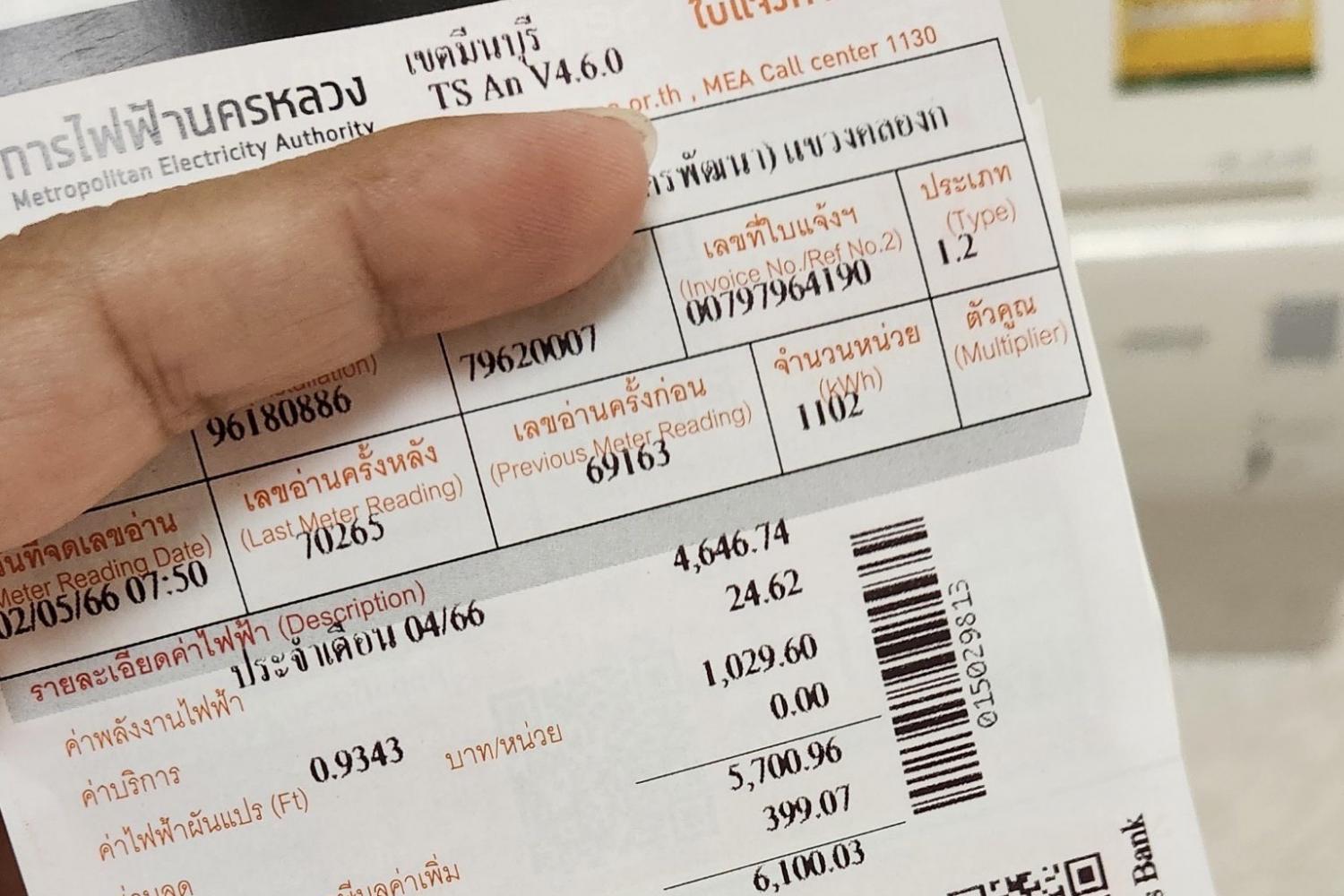
The Srettha Thavisin cabinet quickly approved a plan to reduce the power tariff at its first meeting earlier this month in a bid to reduce electricity bills.
The new tariff rate of 3.99 baht per kilowatt-hour (unit) replaces 4.45 baht a unit, applicable between September and December this year.
If the government wants to ease electricity prices for a longer period, it may need to change the Thai energy price structure.
Explainer explores the process to make power bills cheaper and whether it is possible for the government to restructure energy prices.
Q: How are power bills reduced?
One quick way is to extend the period of debt repayment to state-run Electricity Generating Authority of Thailand (Egat), according to media reports, citing Energy Minister Pirapan Salirathavibhaga.
He said this measure can be implemented by September without requiring a lengthy consideration process needed for other options.
The cabinet initially approved a plan to reduce the power tariff to 4.10 baht a unit, then later, after its meeting on Sept 18, resolved to cut the rate further to 3.99.
The new rate was suggested by Mr Pirapan following a meeting with the Energy Regulatory Commission (ERC), according to government spokesman Chai Watcharong.

To promote the tariff reduction, the ERC met with Egat and PTT Plc on Sept 20 and discussed ways to finalise the policy.
Egat was instructed to come up with a plan to adjust its debt management, while PTT was told to decrease its gas sales prices to 304.79 baht per million British thermal units (BTU) or less, down from 323.37 baht per million BTU, according the ERC.
The previous power tariff of 4.45 baht a unit scheduled for September to December was mainly determined by three factors: lower gas prices, public opinion and a need to reimburse Egat, which reported a loss of 150 billion baht because it subsidised electricity bills between September 2021 and December 2022.
The Egat subsidies were to ease the financial burden on people and businesses, especially as the Russia-Ukraine conflict drove up global gas prices.
Gas makes up around 60% of the fuel used for power generation in Thailand.
The 4.45-baht rate, a 5.3% drop from 4.7 baht per unit imposed from May to August, was the lowest among three power tariff choices the ERC asked the public to consider during a survey from July 7-21.
The rate comprises a base tariff of 3.78 baht and Ft of 0.6689 baht a unit, a decrease of 26% from around 0.91 baht per unit.
Ft, widely known as fuel tariff, originally stood for float time, a fuel adjustment charge at a given time. Ft is determined by various factors, including fuel prices.
The base tariff indicates the costs of power plants and distribution systems.
If the ERC used the 4.45-baht rate, Egat was estimated to clear its loss by April 2025.
With a power tariff of 3.99 baht per unit, it will take more time for Egat to clear its debt.
Q: Can debt repayment to Egat be delayed?
Egat insisted previously it could not withstand any further requests for cheaper electricity bills during the final four months of this year as it would affect its future investment in power infrastructure.
The authority said the 4.45-baht tariff was acceptable and should not be amended as it would mean a longer time to settle its debt.
Boonyanit Wongrukmit, former governor of Egat, said in August the authority had paid back two instalments and had five more to go to clear its debt by April 2025.
If the payback period is extended, it will affect Egat's cash flow and credit rating, which could lead to higher loan rates, he said.
This would impact Egat's investment in power transmission expansion, eventually marring energy security in the long run, said Mr Boonyanit.
Q: How can Thai energy prices be restructured to curb expensive power bills in the long term?
There are many ways to reduce the Ft, including gas price management and greater imports of electricity from hydropower plants in Laos, said a former senior energy official who requested anonymity.
Thailand imports liquefied natural gas (LNG) for power generation as domestic gas supply is insufficient. The country buys LNG both in the spot market and through long-term purchase contracts.
To avoid LNG price fluctuations in the spot market, which may result in expensive power bills, the country should consider signing more long-term LNG purchase contracts, said the source.
In many cases, LNG prices under these contracts are much cheaper than prices in the spot market, said the source.
Another option is to reach a deal in talks with Cambodia on the overlapping claim area (OCA) in the upper portion of the Gulf of Thailand to jointly develop a new petroleum site, said the source.
The OCA is likely to be a new petroleum source for both countries because the site is located near the Bongkot and Erawan gas blocks, according to the Department of Mineral Fuels.
A third method to curb electricity prices is to import more power from Laos, said the source.
Laos previously announced it wants to become the "Battery of Southeast Asia", with the potential to increase power generation capacity to 40 gigawatts.
Thailand currently imports 5.93GW of electricity from Laos.
According to Egat's fuel usage for power generation, gas makes up 60% of all fuels, with 15% from coal, 15% from renewable energy and 10% from electricity imports from Laos and Malaysia.
The Federation of Thai Industries (FTI) welcomed the cabinet's approval of a lower power tariff, but suggested the government make changes to the Thai energy price structure to ease expensive electricity bills in a more sustainable way.
Kriengkrai Thiennukul, chairman of the FTI, said the tariff cut and reduction of diesel prices are a good start, but these can only work in the short term.
Without a serious inquiry into flaws in the national energy price structure, costly electricity and oil will return, he said.
